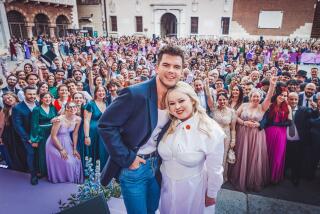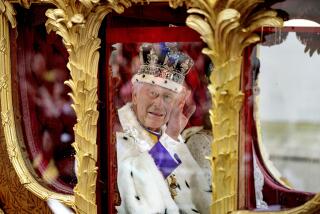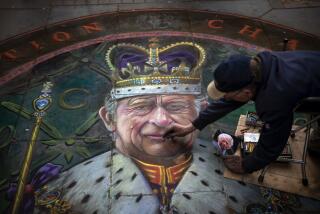Culture : British Elite Savors Season in the Sun : Is the class system dead in England? Hardly. It thrives in the Ascot racing boxes, on the River Thames and at Wimbledon Center Court.
- Share via
LONDON — It starts with a London flower show and ends with races and regattas around the Isle of Wight--a 10-week social whirl that still says a lot about who you are and who you know in a country supposedly becoming less concerned about class.
To Britons, it’s known simply as “The Season”--a series of colorful spring and summer events and festivals that mostly resembles a rolling outdoor party centered on the Royal Family.
Last week’s Royal Ascot horse racing extravaganza and the Wimbledon tennis tournament this week and next are among the season’s highlights--golden opportunities for Britain’s upper classes, and those who aspire to such status, to alert each other that they are still alive and well. And well-connected.
“The key to the season,” commented one friend of the royals, “is not so much to see but to be seen. And the closer you are seen to the queen or the royals, the better. It tells the world you’re still in the swim. . . .”
“Everyone says the season is not what it used to be, but everyone still manages to turn out,” added another observer of Britain’s aristocracy. “We all agree that the events have been commercialized, cheapened and even tarnished. But still the season carries on: It’s the place to see your chums from other parts of the country.”
Prime Minister John Major--the son of a trapeze artist and a dance-hall singer who dropped out of high school--preaches against Britain’s “ingrained, entrenched, damaging (class) attitude” and says his goal is a “genuinely classless society.”
Meanwhile, however, the vast amount of media space and money devoted to the season testifies that while the concept of class may be slowly changing, the country is still very class-conscious.
Originally conceived as a series of independent events patronized by the Royal Family, the season soon developed into an institution through which members of the aristocracy and the upper classes could show off their eligible daughters to suitable prospective mates.
“It was really the debutante season,” recalls a well-born lady, “when one was presented to the queen. But in recent years that concept is pretty much passe.”
Adds social historian Martin Jacques: “The season was about defining social groups and difference in an (Edwardian) era of very rapid social change and the spread of mass democracy. The Royal Family sought to reach outwards and downwards, the upper middle classes upwards and away from. The season was a perfect device.”
Today, the tradition of fancy dress, which defines social status, carries on. There are men in morning suits and women in hats at the Royal Ascot racing week; boater hats and women’s skirts below the knee at the Henley rowing races; men in black tie and women in full evening dress at the Glyndebourne Opera, and suitably nautical blazers at the Cowes Regatta.
The food is almost as noteworthy as the fashion--thousands of pounds of salmon, strawberries and cream at Wimbledon and countless bottles of champagne (15,000 at Ascot alone).
The season revolves around the queen, the Royal Family and the aristocracy, who by their presence and patronage give cachet to more than a dozen events. And the presence of such a royal nucleus attracts thousands of others who attend the events to bask in what remains these days of the royal glow.
In fact, the season has also come to be an indicator of who’s in and who’s out among Britain’s hard-pressed royals. For instance, the ostracized Duchess of York, who is separated from her husband, Prince Andrew, did not receive a royal invitation to Ascot this year and has lost her place in the royal box at Wimbledon--sanctions duly played up in the popular press.
And Princess Diana, who reportedly made herself available for at least one day at the royal box at Ascot, was not issued an invitation from the queen--though the palace insisted it was not a direct snub.
Each event during the season has its own pecking order, with the masses in the grandstand or outer reaches and the favored in their inner sanctums: the Royal Enclosure at Ascot, the Steward’s Enclosure at Henley, the Royal Yacht Squadron at Cowes and the All-England Club at Wimbledon.
The events run heavily to sports: horse racing, polo, tennis, yachting, sculling, cricket. (Forget soccer, darts, snooker or rugby, which are viewed as somewhat lower class.) However, there are non-sporting events as well, such as the Chelsea Flower Show, the Buckingham Palace garden parties, the Royal Academy Summer Exhibition and the Last Night at the Proms at Albert Hall.
Among those attracted to the social whirl are many well-to-do Americans who rent apartments in London for the festivities.
For some, the season is a reassuring social anchor in a world sometimes run amok. “Ascot is one of these events which suggests great permanency in our society, no matter how much the meeting changes superficially,” wrote diarist Peter McKay of the Evening Standard.
The old aristocracy often views some of the “newcomers” attracted to the season’s events as social climbers.
“Ascot’s pretensions to elitism have been swept away by a shoving horde of arrivistes who rent their morning suits,” sniffed Ross Benson, the gossip columnist of the Daily Express newspaper.
Whatever it once was, however, this British social club, the class system, is today flexible enough to absorb many newcomers--as long as they are properly well-heeled.
“The fascinating thing about the British class system,” says historian Jacques, “is its ability to mutate, to reproduce itself in other forms, to attract outsiders and persuade them to be part of the act.”
Adds social commentator Stephen Glover: “John Major is wrong if he thinks that our class system is particularly rigid. If you are rich or ambitious or forthright, you can always trade up, and if you are lazy or eccentric you can even trade down.”
Andrew Neil, editor of the Sunday Times, says, “The old Establishment has always preserved its position by not being too exclusive--it has been wily enough to absorb the up-and-coming and convert them to their attitudes and mannerisms.”
Glasgow-born Neil, a bitter opponent of the class system, argues: “Class and the snobbery it provokes still matter far too much in Britain, but we are a far more mobile society than we used to be. There are, of course, still far too many important jobs held because of connections and privilege, rather than ability, as even a cursory glance at some financial boardrooms will confirm.
“But almost every important activity these days is open to intense international competition: Companies and institutions that continue to employ upper-class twits are unlikely to survive and prosper.”
In many cases, a person’s accent signals his place in the class structure in Britain.
Neil says this confirms the old adage that “when one English person speaks, another one immediately classifies him,” and adds, “No class system in the world is so audible, which is also why it is so pernicious and enduring.”
But social mobility has made inroads in Britain’s political circles, even in the Conservative Party, which was traditionally run by aristocrats with Eton, Harrow and Oxbridge educations behind them.
The last aristocratic prime minister was Sir Alec Douglas-Home 30 years ago; successors Harold Wilson, Edward Heath, James Callaghan, Margaret Thatcher and now John Major all came from modest backgrounds.
So the argument over the class system continues in Britain, with its defenders supporting what they deem is an ordered, gracious way of life seeking to maintain the best of British traditions, and outsiders such as Major and Neil railing at the damage they see it doing to society.
“If the traditional British elite had made a great success of running my country,” says Neil, “as successful, say, as the elites of Germany, Japan and America, then maybe it would be a club worth joining. But our Establishment has presided over economic decline and bequeathed a culture of mediocrity. Why join a bunch of losers?”
And as the debate rages, the season tries to straddle both worlds, combining the trappings of an older order and the aspirations of the new, according to Jacques.
“And that, of course, is the problem,” he adds. “The more the country tries to change, the more it stays in the same old place.”
A Stroll Through ‘The Season’
For 10 weeks in late spring and early summer, a goodly chunk of the British upper classes attend various social events to spend money, drink champagne, wave at friends and ogle the Royal Family. The highlights this year:
* The Chelsea Flower Show, May 27-June 30. Spectacular display of floral arts at the tented grounds of London’s Royal Hospital along the Thames. Usually opened by a leading royal. Attracts thousands from around the country.
* The Derby (pronounced “darby”), June 2. Britain’s most famous flat race, held at Epsom Downs southwest of London. Named after the Earl of Derby, who founded the event in 1779. One of the most democratic events of the season, with free entrance to the grounds. The queen attends.
* The Royal Academy’s Summer Exhibition, June 6-Aug. 15. One of the largest contemporary art exhibitions in the world, with thousands of pictures. Reasonably good to execrable ones hang at the Royal Academy in Piccadilly, London. Critics roast the show, but the public comes in droves.
* Royal Ascot, June 15-18. The jewel in the season’s crown, it was the venue for Eliza Doolittle’s triumph in the musical “My Fair Lady.” The horse-racing grounds are open to all with tickets, but the stands run up the scale to the royal box. The queen is a regular.
* Wimbledon, June 21-July 4. The most famous world-class event on the calendar. Tickets to the tennis matches go for astronomical prices but can be had from scalpers. Strawberries and cream, accompanied by Pimm’s Cup drinks, go for usurious prices.
* Henley, June 30-July 4. Rowing competition at a small town on the River Thames west of London. Most visitors’ attention turns to food, drinks and one another while sprawled on the grassy banks. Straw boater hats are the rage.
* Cartier International Polo Day, July 25. The scene for those familiar with Jilly Cooper’s sex-drenched potboilers on the horsy set. Royals such as Prince Charles and his father, Prince Philip, love polo. Full of pukka, chukka types who speak a language of their own.
* Cowes, July 31-Aug. 7. Dominated by the international sailing fraternity in races and regattas around the Isle of Wight near Portsmouth and Southampton. There are balls every night.
More to Read
Sign up for Essential California
The most important California stories and recommendations in your inbox every morning.
You may occasionally receive promotional content from the Los Angeles Times.













